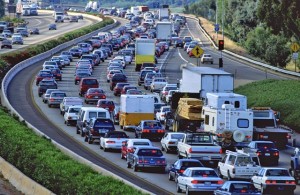 Anti-transit group COAST is back up to its usual routine, publishing yet another attack piece on mass transit. But in their attempt to bash rail, COAST actually proves how necessary public transportation is.
Anti-transit group COAST is back up to its usual routine, publishing yet another attack piece on mass transit. But in their attempt to bash rail, COAST actually proves how necessary public transportation is.
Various sources are reporting on a nationwide strike occurring in France, which is disrupting bus, rail, and air travel. Several labor unions unrelated to transportation also are involved in the strike, causing post offices, schools, hospitals, and radio stations across the country to close.
COAST writes about the gridlock that ensued as transit options were reduced:
Commuters in Paris packed into cars during the reduced service, and London buses were overflowing. City sidewalks were full of walkers and thousands of bikers took to the streets in both capitals.
As usual, COAST goes on to argue in favor of increased automobile dependence, equating driving with “freedom†and “self-reliance.â€Â But in this case, you can see that gridlock, not freedom, is the true consequence of an auto-only transportation network. Although COAST titled their article “Government Trains Cripple France & Britain,” it’s apparent that quite the opposite is true — France and Britain’s transit systems are crippled without rail transit.
We know this situation all too well in Cincinnati, where we currently lack rail. Just this weekend, the Brent Spence Bridge was jam-packed with traffic as other bridges were closed during Riverfest. Two rail tracks connecting Ohio and Kentucky could have carried more riders than all 8 barely-crawling lanes of the Brent Spence Bridge, combined.
COAST also takes a jab at the cost of rail transit. But let’s think about the astronomical cost of the roads and highways that would be necessary if France’s rail system didn’t exist. How many additional lane-miles of highways would the taxpayers have to fund? How many private homes would the government need to purchase and demolish? What about the indirect costs of increased pollution, lost time spent in traffic, and decreased health associated with a car-centric lifestyle?
You might buy into COAST’s argument that “roads pay for themselvesâ€, but even The American Conservative now understands that’s just a myth. According to William S. Lind, co-author of Moving Minds: Conservatives and Public Transportation, “Highways only cover 58 percent of their costs from user fees, including the gas tax.â€Â That means 42% of the cost of highways is subsidized by the American taxpayer.
COAST also fails to mention the backups at France’s airports as the number of flights were reduced during the strike. COAST has rarely commented on air travel, perhaps because they’re not sure how to categorize it. Although airlines are privately operated, the government operates the Federal Aviation Administration and spends great sums of money building airport concourses and runways.  In the 1990s, the Cincinnati-Northern Kentucky International Airport spent $400 million on runway and concourse construction; much of this infrastructure is now sitting dormant due to flight reductions in recent years. If that doesn’t warrant a “boondoggle” label from COAST, we’re not sure what does.
Planes also don’t meet the “freedom†and “self-reliance†criteria that COAST lays out for transportation, unless you happen to have your pilot’s license.
We predict COAST will continue to complain about investment in rail transit while ignoring the significantly larger subsidies given to road infrastructure in the United States. But if COAST truly wanted to live up to its libertarian ideals, they would be arguing for the most efficient and cost-effective multi-modal transit system possible, which should include both roads and rail.

